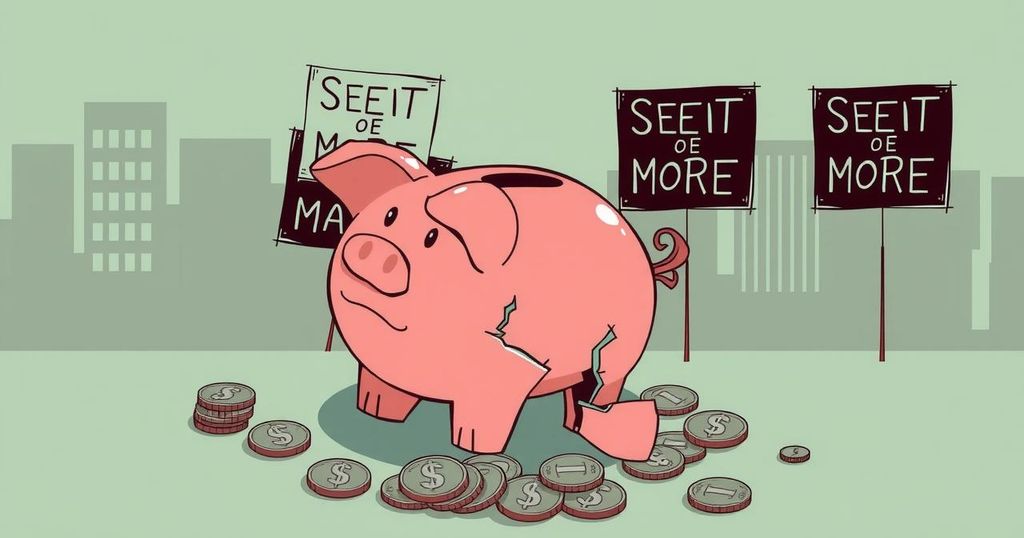Argentina is currently in an economic crisis with high inflation and widespread union strikes. President Javier Milei’s controversial austerity measures aimed at stabilizing the economy include proposed dollarization and significant budget cuts. These policies have led to major unrest, with unions organizing strikes to protest layoffs and salary cuts. The path forward remains uncertain as the government navigates these challenges while facing strong public discontent.
Argentina is currently grappling with significant economic challenges, characterized by rampant inflation and widespread discontent manifesting through union protests. In March 2025, the country reported its 2024 economic statistics, revealing an inflation rate of 118%, despite a decrease from the previous year’s staggering 211%. This decline is attributed to the stringent fiscal measures and reforms enforced under President Javier Milei’s administration, who has prioritized economic stabilization.
Under President Milei’s radical agenda, substantial austerity measures were promised to eliminate the fiscal deficit. Central to his campaign were two major initiatives: the dollarization of the Argentine economy and drastic reductions in government expenditure to control inflation. However, the actual execution of these plans has faced substantial political hurdles, leading to a change in his initial appointment for the central bank, shifting from Emilio Ocampo to Santiago Bausili amidst Congressional limitations.
The impact of austerity measures on public expenditure has ignited widespread unrest in Argentina. The General Confederation of Labor (CGT), the prominent trade union federation, has called for a general strike on April 10, 2025, marking their third instance of dissent since Milei took office. CGT Secretary General Hector Daer emphasized that the strike focuses on rising unemployment, stating that it would be impossible to remain passive amidst increasing layoffs.
Public dissatisfaction reflects deep concerns across multiple economic sectors as workers face diminished salaries and declining purchasing power. Complaints regarding job losses and decreased investment in social health services have intensified. Daer’s commitment, “This strike will not be lifted,” emphasizes the collective resistance against the ongoing austerity policies under President Milei’s administration.
Simultaneously, the government’s strategy to manage currency devaluation is underway, characterized by a recent adjustment of the official exchange rate by 54%. However, analysts remain doubtful about Milei’s ability to meet his economic objectives, especially with inflation rates closely tied to currency value. Current economic figures underscore severe inflationary pressures, such as the astronomical price of a Big Mac compared to American costs, signaling profound economic instability.
What started as optimism about lifting currency controls has now transitioned into skepticism. The government has struggled to effectively dismantle complex currency regulations, instead resorting to minor devaluations as inflation rates hover around 2% monthly. Forecasts indicate that annual inflation might reach 23%, leaving the economic outlook uncertain.
The CGT has also announced participation in a march commemorating victims of Argentina’s military dictatorship on March 24, a historical reminder of the country’s ongoing struggle with governance issues. Amid the escalating unrest, President Milei is caught in a precarious situation, attempting to balance his radical economic policies with an increasingly discontented public. Presidential spokesman Manuel Adorni has downplayed union actions as politically motivated, insisting there are no valid reasons for strikes amid ongoing negotiations with the International Monetary Fund regarding future fiscal programs.
The evolving scenario in Argentina reflects broader narratives of economic distress and societal challenges, juxtaposing the ambitious fiscal plans of the Milei administration against an increasingly vocal opposition. As the Argentine populace stands at a pivotal crossroads, the pressing question remains: Can these sweeping reforms stabilize the economy, or will the continued push for austerity exacerbate the nation’s economic woes? The global community watches attentively as each action taken by President Milei reverberates beyond Argentina, potentially influencing governance perceptions in the region.
In summary, Argentina is facing a tumultuous economic landscape marked by extreme inflation, public dissent, and contentious austerity measures under President Milei’s administration. While inflation rates have declined slightly, the government’s attempts at economic stabilization have ignited widespread protests led by unions. The ongoing unrest illustrates the delicate balance between implementing radical reforms and addressing public grievances, leaving the future economic stability of the nation uncertain. As global attention focuses on Argentina, the outcomes of these challenging economic decisions could reshape regional governance perspectives.
Original Source: evrimagaci.org






